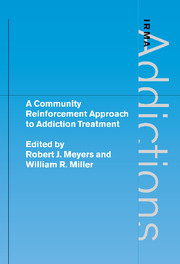Book contents
- Frontmatter
- Contents
- List of contributors
- Preface
- Acknowledgments
- 1 Developing the Community Reinforcement Approach
- 2 Practice and Promise: The Azrin Studies
- 3 The Treatment
- 4 A Comparison of CRA and Traditional Approaches
- 5 Community Reinforcement and Traditional Approaches: Findings of a Controlled Trial
- 6 CRA with the Homeless
- 7 CRA and Treatment of Cocaine and Opioid Dependence
- 8 Community Reinforcement and Family Training (CRAFT)
- 9 Summary and Reflections
- References
- Index
4 - A Comparison of CRA and Traditional Approaches
Published online by Cambridge University Press: 05 August 2012
- Frontmatter
- Contents
- List of contributors
- Preface
- Acknowledgments
- 1 Developing the Community Reinforcement Approach
- 2 Practice and Promise: The Azrin Studies
- 3 The Treatment
- 4 A Comparison of CRA and Traditional Approaches
- 5 Community Reinforcement and Traditional Approaches: Findings of a Controlled Trial
- 6 CRA with the Homeless
- 7 CRA and Treatment of Cocaine and Opioid Dependence
- 8 Community Reinforcement and Family Training (CRAFT)
- 9 Summary and Reflections
- References
- Index
Summary
The degree of methodological control in Azrin's early studies (reviewed in Chapter 2) and the surprisingly large treatment effects that were obtained established the Community Reinforcement Approach (CRA) as one of the more promising interventions for alcohol problems. The treatment procedures were reasonably well specified, the main effects of intervention were robust, and the largest specific impact was found among less socially stable (e.g., unmarried) clients who would generally be regarded as having a poorer prognosis. On the basis of the Azrin studies alone, several structured reviews of the treatment-outcome literature classified CRA among methods having the strongest empirical evidence of efficacy (e.g., Finney & Monahan, 1996; Holder et al.,1991; Miller et al., 1995).
Addressing limitations of the early studies
Nevertheless, there were important methodological limitations in the early CRA studies, most of which were conducted more than 25 years ago. As we launched a new line of research on CRA, we sought to address these limitations:
Sample sizes had been quite small.
CRA had not been tested outside the rural Illinois setting in which it had been developed, and replication was needed with a more heterogeneous population.
Follow-up had been limited to 6 months in the outpatient trial (Azrin et al., 1982), and a longer course of follow-up was clearly desirable.
Outcome measurement relied entirely on client self-report.
[…]
Keywords
- Type
- Chapter
- Information
- Publisher: Cambridge University PressPrint publication year: 2001
- 3
- Cited by



